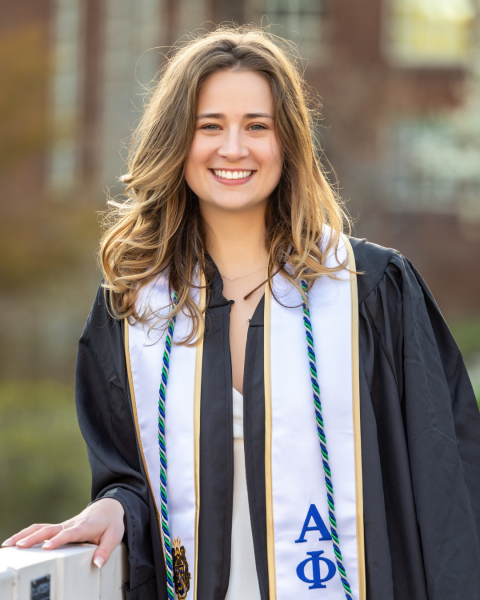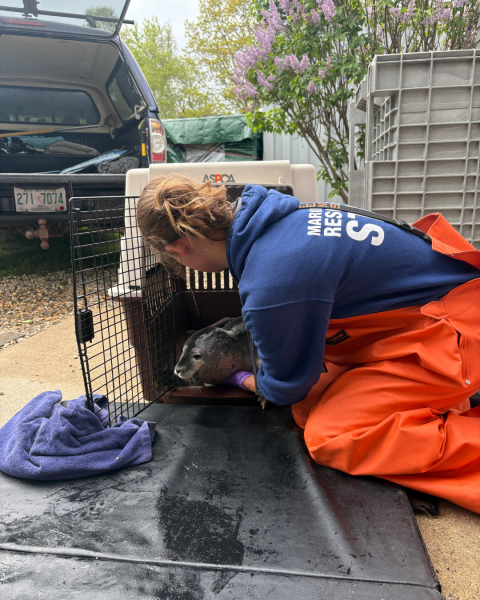
Lauren McDowell ’24, from Winchester MA, earned a degree in marine, estuarine, and freshwater biology with a dual major in sustainability at UNH. She is now the Community Outreach Manager for the Seacoast Science Center Marine Mammal Rescue Program, where she helps rescue seals and other marine mammals along the New Hampshire and northern Massachusetts coast.
When someone reports a stranded or injured animal, Lauren helps coordinate the response and data collection and sometimes heads into the field herself. She also runs community education programs about ocean conservation, organizes events like seal walks and kayak tours, and raises funds to support the program. By building relationships with local communities, schools, donors, and government agencies, she helps connect people with the ocean and inspires them to protect marine life.
Tell us about your current role.
Lauren McDowell: I work with a team that responds to stranded or injured seals and other marine mammals along the New Hampshire and northern Massachusetts coastline. My role includes coordinating rescue responses, collecting data, and sometimes assisting in the field. I also run community education programs, organize events such as seal walks and kayak tours, and raise funds to keep our program running. A big part of my job is building relationships with communities, schools, donors, and agencies to spread awareness about marine mammals and how to protect them.
How did your time at UNH prepare you for where you are today?
Lauren: My time at UNH gave me a strong foundation in marine biology through fieldwork, lab experiences, and research opportunities. The university’s location near the coast — and close to the Seacoast Science Center — provided direct access to marine environments and valuable hands-on experience. Being part of the Sustainability dual major program taught me how to connect science with community engagement and environmental policy, something I continue to do in my work today. UNH also helped me build professional relationships with other marine biologists, many of which remain an important part of my network.
Where do you see yourself in five years? In ten?

Lauren: In five years, I see myself continuing to grow as a marine conservation professional, ideally leading or coordinating programs focused on marine mammals while staying hands-on with animals. In ten years, I hope to be in a leadership role at a conservation organization, agency, or aquarium, influencing regional strategies for marine wildlife protection. I’d like to mentor future conservationists, contribute to impactful research or policy, and bridge the gap between science and the public to create lasting change for our oceans.
What do you know now that you wish you’d known as an undergrad?
Lauren: I wish I’d realized sooner that it’s okay not to have everything figured out. Things will work out the way they’re supposed to, even if the path looks different than you expected.
What person or course most influenced you while at UNH? How?
Lauren: So many people shaped my UNH experience, including Lindsey Williams, Michelle Fournet, Easton White, Erin Hale, Leigh Pratt, and Becca Toppin. I wouldn’t be where I am today without their faith in me as a marine biologist.
What advice do you have for students interested in your field?
Lauren: Marine biology might seem like a specialized major, but there are so many paths to explore. Try everything—internships, volunteering, research, jobs, or classes outside your comfort zone. Every experience, even the unexpected ones, can teach you something valuable and might lead you to your greatest passion.
What do you miss most about UNH?
Lauren: I’m lucky to live close enough that I work at UNH every week, but I miss having all my friends nearby. Those relationships made UNH feel like home.
Please tell us a fun fact about yourself.
Lauren: During my junior year, I studied abroad in Turks and Caicos through the School for Field Studies Program. I participated in lionfish removal efforts by spearfishing this invasive species to help protect the local reef ecosystem. It was an amazing experience, and I highly recommend the program to any future marine biologists!